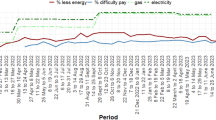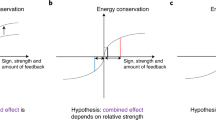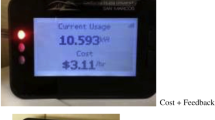Abstract
Public estimates of energy use suffer from severe biases. Failure to correct these may hinder efforts to conserve energy and undermine support for evidence-based policies. Here we present a randomized online experiment that showed that home energy perceptions can be improved. We tested two simple, potentially scalable interventions: providing numerical information (in watt-hours) about extremes of energy use and providing an explicit heuristic that addressed a common misperception. Both succeeded in improving numerical estimates of energy use, but in different ways. Numerical information about extremes primarily improved the use of the watt-hours response scale, while the heuristic improved underlying understanding of relative energy use. As a result, only the heuristic significantly benefitted judgements about energy-conserving behaviours. Because understanding of energy use also predicted self-reported energy-conservation behaviour, belief in climate change, and support for climate policies, targeting energy misperceptions may have the potential to shape individual behaviour and national policy support.
This is a preview of subscription content, access via your institution
Access options
Access Nature and 54 other Nature Portfolio journals
Get Nature+, our best-value online-access subscription
$29.99 / 30 days
cancel any time
Subscribe to this journal
Receive 12 digital issues and online access to articles
$119.00 per year
only $9.92 per issue
Buy this article
- Purchase on Springer Link
- Instant access to full article PDF
Prices may be subject to local taxes which are calculated during checkout



Similar content being viewed by others
Data availability
All data generated or analyzed during this study are available online: https://osf.io/2qbxt/
Code availability
The code to generate figures and results is available upon request.
References
IPCC Climate Change 2014: Mitigation of Climate Change (eds Edenhofer, O. et al.) (Cambridge Univ. Press, 2015).
Dietz, T., Gardner, G. T., Gilligan, J., Stern, P. C. & Vandenbergh, M. P. Household actions can provide a behavioral wedge to rapidly reduce US carbon emissions. Proc. Natl Acad. Sci. USA 106, 18452–18456 (2009).
Attari, S. Z., DeKay, M. L., Davidson, C. I. & De Bruin, W. B. Public perceptions of energy consumption and savings. Proc. Natl Acad. Sci. USA 107, 16054–16059 (2010).
Lesic, V., de Bruin, W. B., Davis, M. C., Krishnamurti, T. & Azevedo, I. M. Consumers’ perceptions of energy use and energy savings: a literature review. Environ. Res. Lett. 13, 033004 (2018).
Attari, S. Z., DeKay, M. L., Davidson, C. I. & de Bruin, W. B. Changing household behaviors to curb climate change: how hard can it be? Sustainability 4, 9–11 (2011).
Larrick, R. P. in Blackwell Handbook of Judgment & Decision Making (eds Koehler, D. K. & Harvey, N.) Ch. 16 (Blackwell, 2004).
White, L. V. & Sintov, N. D. Inaccurate consumer perceptions of monetary savings in a demand-side response programme predict programme acceptance. Nat. Energy 3, 1101–1108 (2018).
Delmas, M. A., Fischlein, M. & Asensio, O. I. Information strategies and energy conservation behavior: a meta-analysis of experimental studies from 1975 to 2012. Energy Policy 61, 729–739 (2013).
Darby, S. The Effectiveness of Feedback on Energy Consumption: A Review for DEFRA of the Literature on Metering, Billing and Direct Displays (Univ. of Oxford Environmental Change Institute, 2006).
Shepard, R. N. Psychological relations and psychophysical scales: On the status of “direct” psychophysical measurement. J. Math. Psychol. 24, 21–57 (1981).
Laming, D. R. J. The Measurement of Sensation (Oxford Univ. Press, 1997).
Brunswik, E. Perception and the Representative Design of Psychological Experiments (Univ. of California Press, 1956).
Cowen, L. & Gatersleben, B. Testing for the size heuristic in householders’ perceptions of energy consumption. J. Environ. Psychol. 54, 103–115 (2017).
Kahneman, D. & Frederick, S. in Heuristics and Biases: The Pschychology of Intuitive Judgment (eds Gilovich, T. et al.) Ch. 2 (Cambridge Univ. Press, 2002).
Schley, D. R. & DeKay, M. L. Cognitive accessibility in judgments of household energy consumption. J. Environ. Psychol. 43, 30–41 (2015).
Stevens, S. S. On the theory of scales of measurement. Science 103, 677–680 (1946).
Huttenlocher, J., Hedges, L. V. & Duncan, S. Categories and particulars: Prototype effects in estimating spatial location. Psychol. Rev. 98, 352 (1991).
Kahneman, D. & Tversky, A. in Handbook of the Fundamentals of Financial Decision Making: Part I (eds MacLean, L. C. & Ziemba, W. T.) Ch. 6 (World Scientific, 2013).
Landy, D., Guay, B. & Marghetis, T. Bias and ignorance in demographic perception. Psychon. Bull. Rev. 25, 1–13 (2017).
Hollingworth, H. L. The central tendency of judgment. J. Philos. Psychol. Sci. Methods 7, 461–469 (1910).
Varey, C. A., Mellers, B. A. & Birnbaum, M. H. Judgments of proportions. J. Exp. Psychol. Hum. Percept. Perform. 16, 613 (1990).
Frederick, S. W., Meyer, A. B. & Mochon, D. Characterizing perceptions of energy consumption. Proc. Natl Acad. Sci. USA 108, E23 (2011).
Newell, B. R. & Shanks, D. R. Prime numbers: anchoring and its implications for theories of behavior priming. Soc. Cogn. 32, 88–108 (2014).
Simon, H. A. & Newell, A. Heuristic problem solving: the next advance in operations research. Oper. Res. 6, 1–10 (1958).
Attari, S. Z. Perceptions of water use. Proc. Natl Acad. Sci. USA 111, 5129–5134 (2014).
Kollmuss, A. & Agyeman, J. Mind the gap: why do people act environmentally and what are the barriers to pro-environmental behavior? Environ. Educ. Res. 8, 239–260 (2002).
Drummond, C. & Fischhoff, B. Individuals with greater science literacy and education have more polarized beliefs on controversial science topics. Proc. Natl Acad. Sci. USA 114, 9587–9592 (2017).
Abrahamse, W., Steg, L., Vlek, C. & Rothengatter, T. A review of intervention studies aimed at household energy conservation. J. Environ. Psychol. 25, 273–291 (2005).
Asensio, O. I. & Delmas, M. A. Nonprice incentives and energy conservation. Proc. Natl Acad. Sci. USA 112, E510–E515 (2015).
Schultz, P. W., Nolan, J. M., Cialdini, R. B., Goldstein, N. J. & Griskevicius, V. The constructive, destructive, and reconstructive power of social norms. Psychol. Sci. 18, 429–434 (2007).
Tversky, A. & Kahneman, D. Judgment under uncertainty: heuristics and biases. Science 185, 1124–1131 (1974).
Kahan, D. M. et al. The polarizing impact of science literacy and numeracy on perceived climate change risks. Nat. Clim. Change 2, 732 (2012).
Newport, F. & Dugan, A. College-educated Republicans most skeptical of global warming. Gallup News https://news.gallup.com/poll/182159/college-educated-republicans-skeptical-global-warming.aspx (2015).
Hart, P. S. & Nisbet, E. C. Boomerang effects in science communication: how motivated reasoning and identity cues amplify opinion polarization about climate mitigation policies. Communic. Res. 39, 701–723 (2012).
Kempton, W. & Montgomery, L. Folk quantification of energy. Energy 7, 817–827 (1982).
Kempton, W. Two theories of home heat control. Cogn. Sci. 10, 75–90 (1986).
Campos, S., Doxey, J. & Hammond, D. Nutrition labels on pre-packaged foods: a systematic review. Public Health Nutr. 14, 1496–1506 (2011).
Gardner, G. T. & Stern, P. C. Environmental Problems and Human Behavior (Allyn & Bacon, 1996).
Dietz, T., Ostrom, E. & Stern, P. C. The struggle to govern the commons. Science 302, 1907–1912 (2003).
American FactFinder (US Census Bureau, accessed 11 April 2018); https://factfinder.census.gov/.
Leiserowitz, A., Maibach, E. W., Roser-Renouf, C., Feinberg, G. & Howe, P. Climate Change in the American Mind: Americans’ Global Warming Beliefs and Attitudes in April 2013 (Yale University and George Mason University, 2013).
Dunlap, R. E., Van Liere, K. D., Mertig, A. G. & Jones, R. E. Measuring endorsement of the New Ecological Paradigm: a revised NEP scale. J. Soc. Issues 56, 425–442 (2000).
Schwartz, L. M., Woloshin, S., Black, W. C. & Welch, H. G. The role of numeracy in understanding the benefit of screening mammography. Ann. Intern. Med. 127, 966–972 (1997).
Cokely, E. T., Galesic, M., Schulz, E., Ghazal, S. & Garcia-Retamero, R. Measuring risk literacy: the Berlin Numeracy Test. Judgm. Decis. Mak. 7, 25–47 (2012).
R Core Team. R: A Language and Environment for Statistical Computing (R Foundation for Statistical Computing, 2013).
Bates, D., Maechler, M., Bolker, B. & Walker, S. lme4: Linear mixed-effects models using ‘Eigen’ and S4. R package version 1.1–13 (2014); https://cran.r-project.org/web/packages/lme4/
Tingley, D., Yamamoto, T., Hirose, K., Keele, L. & Imai, K. mediation: R package for causal mediation analysis. J. Stat. Softw. 59, 1–38 (2014).
Buhrmester, M., Kwang, T. & Gosling, S. D. Amazon’s Mechanical Turk: A new source of inexpensive, yet high-quality, data? Perspect. Psychol. Sci. 6, 3–5 (2011).
Acknowledgements
This work is supported by National Science Foundation grant no. SES-1658804 from Decision, Risk and Management Sciences; and in part by the Office of the Vice President of Research at Indiana University Bloomington through the Emerging Area of Research initiative, Learning: Brains, Machines and Children; the Center for Advanced Study in the Behavioral Sciences (CASBS) at Stanford University; and a grant from Carnegie Corporation of New York. S.Z.A. is an Andrew Carnegie Fellow. We thank all our survey participants and research assistants S. Watkins and D. Lundberg. We also thank B. Bergen, E. Brower and D. Miniard for feedback.
Author information
Authors and Affiliations
Contributions
S.Z.A. and D.L. designed the research. S.Z.A collected the data. T.M. analyzed the data. T.M., S.Z.A. and D.L. wrote the paper.
Corresponding author
Ethics declarations
Competing interests
The authors declare no competing interests.
Additional information
Publisher’s note Springer Nature remains neutral with regard to jurisdictional claims in published maps and institutional affiliations.
Supplementary information
Supplementary Information
Supplementary Notes 1–5, Tables 1–11, Figs. 1–3, methods and refs. 1–6.
Rights and permissions
About this article
Cite this article
Marghetis, T., Attari, S.Z. & Landy, D. Simple interventions can correct misperceptions of home energy use. Nat Energy 4, 874–881 (2019). https://doi.org/10.1038/s41560-019-0467-2
Received:
Accepted:
Published:
Issue Date:
DOI: https://doi.org/10.1038/s41560-019-0467-2
This article is cited by
-
Discrepant implicit and explicit attitudes toward climate change: implications for climate change communications
Sustainability Science (2023)
-
Revisiting the promise of carbon labelling
Nature Climate Change (2022)
-
Assessing Californians’ awareness of their daily electricity use patterns
Nature Energy (2022)
-
Consumer awareness of load shapes
Nature Energy (2022)
-
Zooming-in for climate action—hyperlocal greenhouse gas data for mitigation action?
Climate Action (2022)



